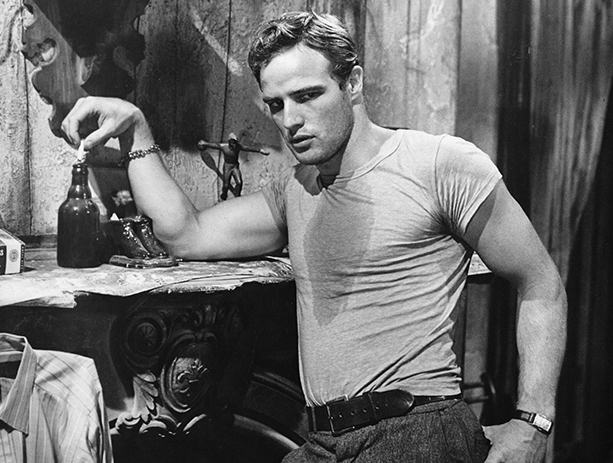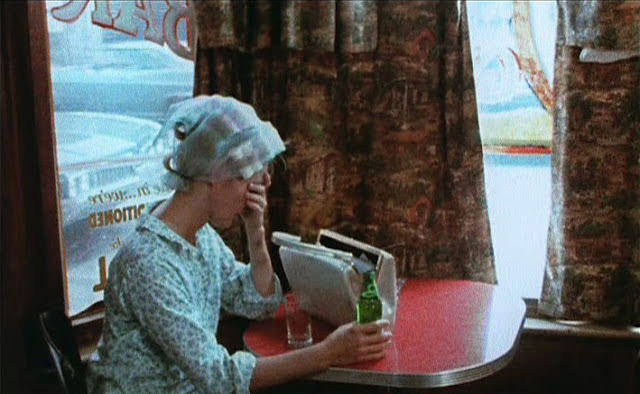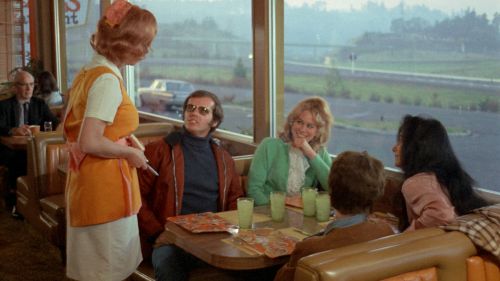
BAM series kicks off with a double feature with Method man Marlon Brando
THE METHOD ON FILM
BAM Rose Cinemas
30 Lafayette Ave. between Ashland Pl. & St. Felix St.
Series runs July 22-28
www.bam.org
“Acting is a curious thing,” Isaac Butler writes in The Method: How the Twentieth Century Learned to Act. “Practically anyone who watches Hollywood movies — which is to say pretty much everyone — spends a staggering amount of talking and thinking about actors. We know intimate details of their private lives. We look to them to speak out about the issues of the day. We evaluate them constantly and festoon the better ones with a trunkload of different prizes. Yet when pressed to explain what good acting actually is, we usually struggle.”
BAM provides plenty for cineastes to struggle over with the one-week series “The Method on Film,” featuring works starring some of the greatest movie actors ever, famous for their discipline and dedication to their craft. It all begins with a double feature with Method man Marlon Brando, playing Stanley Kowalski in Elia Kazan’s A Streetcar Named Desire, then being profiled in the 1966 documentary Meet Marlon Brando. Butler will be at BAM for a prescreening reading and postscreening book signing.
The series continues with Montgomery Clift, Sidney Poitier, Eartha Kitt, Warren Beatty, John Garfield, Kim Stanley, Jack Nicholson, Joanne Woodward, Dustin Hoffman, Anne Bancroft, and Rod Steiger in such classics as The Pawnbroker, The Graduate, A Raisin in the Sun, and Humoresque in addition to a handful of lesser-known works, including two early, influential Russian silent versions of The Queen of Spades. There will also be discussions before the screenings of Arnold Laven’s Anna Lucasta (with dramaturg, director, and archivist Arminda Thomas on July 23) and Edgar G. Ulmer’s American Matchmaker (with Columbia Yiddish professor Jeremy Dauber on July 24). Below is a deeper look at two of the highlights, a pair of unique road movies.

Barbara Loden wrote, directed, produced, and stars in Wanda
WANDA (Barbara Loden, 1970)
Tuesday, July 26, 9:30
www.bam.org
“If you don’t want anything, you won’t have anything, and if you don’t have anything, then you’re as good as dead,” Mr. Dennis (Michael Higgins) tells Wanda Goronski (Barbara Loden) in Wanda. The first theatrical feature written, directed, produced by, and starring an American woman, Wanda, named Best Foreign Film at the Venice International Film Festival, is a raw, naturalistic road-trip movie about an emotionally vacant woman who walks through life in a kind of stupor, wandering into situations to avoid being alone yet still trapped in an unrelenting alienation. Loden, who won a 1964 Tony for her portrayal of Maggie in Arthur Miller’s After the Fall — the play was directed on Broadway by Elia Kazan, whom she would marry four years later and remain with through her tragic death in 1980 — doesn’t try to turn Wanda into a feminist antihero, but she does take all the power away from her, making her completely dependent on other people, primarily men, an excellent counterpoint to Loden herself, who has all the power. Staying on her sister’s (Dorothy Shupenes) couch in the middle of Pennsylvania coal country, Wanda is almost zombielike as she slowly heads to court in curlers and a housecoat and lets the judge award custody of her two children to her soon-to-be-ex-husband (Jerome Thier). “I’m just no good,” she mumbles. Broke and apparently with no faith or hope in her future, she proceeds to get involved with some sketchy losers, including Mr. Dennis, who takes her on a minor crime spree that is a far cry from Bonnie and Clyde. All along the way, she rarely has anything of any interest to say to anyone; the only time she speaks clearly and definitively is when she explains that she likes onions on her hamburgers.
Shot in a cinéma vérité style by documentary cinematographer Nicholas T. Proferes, Wanda is a riveting and infuriating exploration of the death of the American dream as the 1960s come to an end and the country reexamines itself, not necessarily liking what it sees. Apathy competes with melancholy as Wanda is unable and unwilling to take control of her life, dressed in the same white outfit and carrying the same white pocketbook throughout nearly the entire film, but she is more disconsolate than angelic. Much of the film is improvised and most of the characters are portrayed by nonprofessional actors or people who just happened to be in the area, like the scene in which Mr. Dennis and Wanda encounter a family flying a remote-control model airplane. (Higgins would go on to make more than fifty films, including The Conversation, The Stepford Wives, and The Seduction of Joe Tynan.) Coming on the cusp of the women’s liberation movement, Wanda is about a pouty sad-sack who barely ever changes emotion, always wearing the same blank stare. It’s not that she’s promiscuous, adventurous, or even unpredictable; she just is. You desperately want her to take action, to care about something or someone, but it’s just not going to happen. It’s almost as if Loden is setting the groundwork for such future films as Martin Scorsese’s Alice Doesn’t Live Here Anymore and Taxi Driver, which feature such strong, decisive female characters as Alice (Ellen Burstyn) in the former and Iris (Jodie Foster) in the latter, who at least attempt to take matters into their own hands; elements of Wanda can also be found in Aki Kaurismäki’s Match Factory Girl and Chantal Akerman’s Jeanne Dielman, 23, Quai du Commerce, 1080 Bruxelles. Wanda would end up being Loden’s only film as writer and director; she died in 1980 of cancer at the age of forty-eight.

Jack Nicholson places the most famous sandwich order in film history (Sony Pictures Repertory)
FIVE EASY PIECES (Bob Rafelson, 1970)
Tuesday, July 26, 7:00
www.bam.org
A key film that helped lead 1960s cinema into the grittier 1970s, Bob Rafelson’s Five Easy Pieces is one of the most American of dramas, a tale of ennui and unrest among the rich and the poor, a road movie that travels from trailer parks to fashionable country estates. Caught in between is Bobby Dupea (Jack Nicholson), a former piano prodigy now working on an oil rig and living with a well-meaning but not very bright waitress, Rayette (Karen Black). When Bobby finds out that his father is ill, he reluctantly returns to the family home, the prodigal son who had left all that behind, escaping to a less-complicated though unsatisfying life putting his fingers in a bowling ball rather than tickling the keys of a grand piano. Back in his old house, he has to deal with his brother, Carl (Ralph Waite), a onetime violinist who can no longer play because of an injured neck and who serves as the film’s comic relief; Carl’s wife, Catherine (Susan Anspach), a snooty woman Bobby has always been attracted to; and Bobby’s sister, Partita (Lois Smith), a lonely, troubled soul who has the hots for Spicer (John Ryan), the live-in nurse who takes care of their wheelchair-bound father (William Challee).
Rafelson had previously directed the psychedelic movie Head (he cocreated the Monkees band and TV show) and would go on to make such films as The King of Marvin Gardens, Stay Hungry, and Black Widow; written by Carole Eastman, Five Easy Pieces fits flawlessly in between them, a deeply philosophical work that captures the myriad changes the country was experiencing as the Woodstock Generation was forced to start growing up. The film suffers from some unsteady editing primarily in the earlier scenes, but it is still a gem, featuring at least two unforgettable scenes, one that takes place in a California highway traffic jam and the other in a diner, where Bobby places an order for the ages. And as good as both Nicholson, who earned the first of seven Best Actor Oscar nominations, and Black, who was nominated for Best Supporting Actress, are, Helena Kallianiotes nearly steals the picture as a crazy woman railing against the ills of the world from the backseat of Bobby’s car.